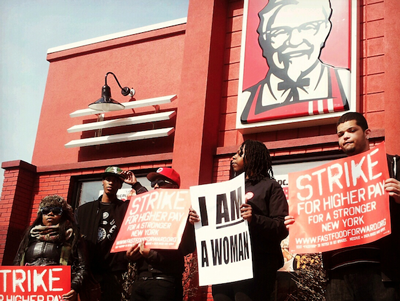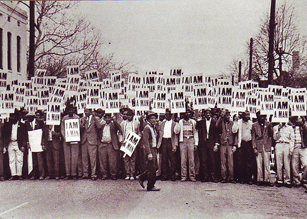- Home
- News
- Features
- Topics
- Labor
- Management
- Opinions/Blogs
- Tools & Resources
NYC Fast-Food Workers Fight Back Against Super-Sized Corporations
By PETER RUGH, Waging Nonviolence— Tianna Smalls had planned on working Thursday, April 4, 2013, but her colleagues convinced her otherwise.
“‘You’re either with us, or you’re for Wendy’s,’” Smalls remembers her co-workers telling her.
Her mother also weighed in Thursday morning as Smalls was heading to work at the franchise in downtown Brooklyn. “She said, ‘If one person stands up, nothing happens. You have to stand together.’”
So Tina Smalls joined approximately 400 other fast food workers across New York City in the April 4 day-long strike — the latest action in the ongoing campaign that is demanding a raise of $15 an hour and attempting to form a cross-franchise union.
Twice as many workers participated in the April 4 walkout than in the previous strike, which launched the union campaign in November 2012.
The ongoing effort has highlighted the highly exploitative conditions faced by those at the deep fryers and cash registers of America’s most profitable fast food outlets, which include Burger King, McDonald’s, Dominos, Pizza Hut and KFC. The actions and considerable media attention has also begun to chip away at the conventional image of a fast-food worker as someone who bears her servitude with a youthful grin.
While it’s true that some workers arrive fresh from high school, the average age of these employees is 28.
Many are middle-aged or even elderly. The majority are immigrants. And all face the reality of working, often for years, at a salary that is at or just above the legally allowed minimum of $7.25.
State lawmakers in Albany recently agreed to raise New York’s minimum to $9 an hour.
But the change will take three years to come into effect, and workers said $9 an hour isn’t much better than what they earn now.
“It’s not easy to join something like this,” said Smalls. “But it’s for a change. We want $15 and a union. We want to be paid so that we can live better.”
The advocacy group New York Communities for Change first initiated plans for the cross-franchise union campaign about a year ago.
Largest Fast-Food Worker Protest
The Service Employees International Union has provided financial sponsorship and legal aid, while faith groups have lent moral encouragement. The first walkout occurred on November 29, which was then the largest protest action of fast-food workers in the industry’s history.
Throughout the winter, organizers super-sized their efforts as New York Communities for Change hired a slew of new organizers, including veterans of the Occupy Movement, to reach out to additional fast-food employees. The group began a petition, which garnered 110,000 signatures even before the second action.
Yet, the decision over whether or not to take part in the April 4 action, which was timed to commemorate the assassination of Martin Luther King Jr., has rested on the shoulders of the workers themselves.
As a result, the cornerstone of the organizing strategy has been debates and secret meetings, which have been taking place inside the city’s fast food joints for months.
Citywide meetings between workers from various franchises have bolstered the shop-by-shop gatherings.
As managers began to sense that something was occurring, they interrogated workers individually, which is illegal, and fired those whom they identified as strike leaders, which is also illegal.
Managers have also held mandatory meetings aimed at convincing their employees not to join the campaign.
One organizer with New York Communities for Change, who asked to remain anonymous since he was not authorized to speak to the press, explained how the intimidation works.
“The boss calls in everybody that works for him and takes about an hour to talk about how bad the union is and how they’re going to take your money,” she said.
She explained that one deterrent strategy is to claim that the only reason organizers are attempting to unionize the fast-food industry is because unions are desperate for members.
Union density has declined, she concedes, but she has a counter-argument that she uses when speaking to workers: “You know what else has gone down throughout the last few decades? Wages. Wages have gone down. Your purchasing power has gone down. Your standard of living has gone down. It’s all correlated with the decline of unions.”
Two economic revolutions of the 1970s — automation and globalization — have also contributed to the downward spiral of wages over the last few decades.
Automation has meant that fewer hands are needed for industrialized labor, while advances in transportation technology exported jobs overseas. Both pushed more and more people into the service industry.
Meanwhile, radical organizers were systematically rooted out of unions during the Cold War under the guise of fighting the internal threat of communism. Left in charge were those who preferred to operate unions with a top-down business-friendly model, a shift in the labor movement that also hampered the expansion of worker power.
Today, as the economic recession continues, employers have a surplus of low-wage labor and only flashes of organizing to oppose the resulting exploitation — a dynamic that is leading to a surge in corporate profits even as wages decline.
This disparity is particularly pronounced in the fast-food industry. In the most extreme example, net profits for McDonald’s totaled $5.5 billion last year, while the company’s rank-and-file report being forced to picket for a raise above minimum wage.
As the U.S. gradually becomes a low-wage nation, fast-food workers on the picket lines in New York are in the vanguard of a struggle to preserve the interests of working people against corporate profits.
Yet, despite this obvious inequality, the campaign to organize these workers has a long journey ahead.
Although hundreds joined the April 4 strike, there are tens of thousands of fast-food workers in the city.
One challenge has been working in an industry with no history of unionization.
“There isn’t a culture around here of a union, of sticking together,” said the organizer with New York Communities for Change, adding that divisions between black, brown and white workers have been an additional impediment. “I wouldn’t say there have been conflicts, but there has been tension,” she said. “My job is to get people that before did not talk to each other to build bridges.”
A week before the April 4 strike, organizers and fast-food workers listened to Baxter Leach, who marched with Dr. Reverend Martin Luther King in Memphis, Tennessee, during the successful 1968 sanitation workers strike.
Leach said that the challenges workers he met in New York described to him brought back memories of what he and his comrades endured before they won union recognition.
“$7.50 an hour, that ain’t no money,” Leach said, who explained that the daily challenges voiced to him by New York City fast-food workers brought back memories of what he and his colleagues experienced as sanitation workers before they won union recognition.
“They ain’t got no insurance. No kind of benefits. They get sick, they get hurt on the job, they can’t go to a doctor. They can’t pay for food. That ain’t living. They’re fighting the same fight for justice we were.”
As with the job of sanitation workers, the task of serving junk food isn’t considered a prestigious position in our society. But those on the picket-lines on April 4 in New York hope that the courage and dignity with which they’ve imbued their struggle will inspire more of their fellow workers to join them and push Reverend King’s dream of equality closer to reality.
List your business in the premium web directory for free This website is listed under Human Resources Directory






